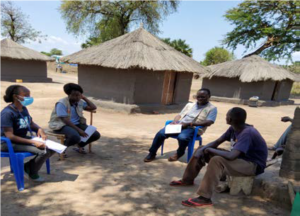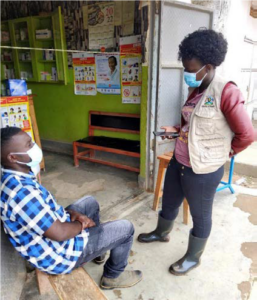 |
Rebecca AkunzirweBScN (MuK), MSc. CEB (Muk) Host Site: AIDS Control Program, Ministry of Health.Host Mentor: Dr. Elena Magongo/Dr. Miriam Nakanwagi |
|||
ABOUT THE FELLOWNow equipped as a certified field epidemiologist, Rebecca holds a master’s degree in Clinical Epidemiology and Biostatistics. Her specific focus lies in enhancing service delivery for children and adolescents living with HIV. During her training, Rebecca was attached to the pediatric and adolescent HIV care and treatment branch of the AIDS Control Program, Ministry of Health. Thanks to the in-service training, Rebecca has acquired significant expertise in leadership, mentorship, scientific communication, quality improvement projects, and outbreak investigation and response, encompassing data analysis, interpretation, and utilization. Leading one outbreak and participating in four others, she gained hands-on experience. Additionally, she played a role in organizing both national and international conferences on HIV and AIDS. Achievements at the Host Site
Fellowship program specific achievements
Local Conferences
International Conferences
Summary of Epidemiological Study:Title: Adherence to the early infant diagnosis alogarithm among infants exposed to HIV in Uganda, 2017-2019 Background: Early infant diagnosis (EID) facilitates early initiation into HIV care and treatment for identified HIV-positive infants. According to the Uganda Ministry of Health (MOH) EID testing algorithm, testing for HIV-exposed infants (HEI) should occur at <6 weeks, 9 and 18 months of age, and 6 weeks after stopping breastfeeding. Uganda has faced challenges with loss to follow-up (LTFU) for EID. We assessed adherence to the EID algorithm for HEI and associated factors. Methods: We analyzed data from the ‘Impact of the National Program for Prevention of Mother-to-Child Transmission of HIV in Uganda (2017−2019)’ study. HIV-positive mothers and their infants enrolled in a prospective cohort (2017−2018) were followed until the HEI tested positive, died, was LTFU, or reached 18 months of age. Of the infants who didn’t die before each timepoint, we calculated the proportion that adhered to the EID algorithm (having HIV tests at all four appropriate timepoints, using 15 months of age as a proxy for 6 weeks after cessation of breastfeeding). We evaluated factors associated with adherence using modified Poisson regression. Results: Among 1,804 HEI, 912 (51%) were male. At baseline, 1,605 (89%) were HIV-negative, 37 (2%) were HIV-positive, and 162 (9%) had indeterminate or missing results. Among baseline-negative HEI, 1,212 (76%) remained negative at 9 months, 1 (0.06%) tested positive, 18 (1%) died, and 374 (23%) did not test. Of those negative at 9 months, 1,066 (88%) remained negative at 15 months, 2 (0.2%) tested positive, 4 (0.3%) died, and 140 (12%) did not test. Of those negative at 15 months, 793 (74%) were negative at 18 months, 5 (0.5%) died, and 268 (25%) did not test. Overall, 164 (10%) of 1,605 HEI who were HIV-negative at baseline were tested only at baseline. Overall adherence to the complete EID algorithm timeframe was 46% (833/1,777). Perceived discrimination due to HIV status [RR=0.80, 95%CI (0.66-0.97)], having fewer pregnancies [RR=0.96, 95%CI (0.94-0.99)] and reporting sexual violence [RR=0.74, 95%CI (0.65-0.88)] were associated with non-adherence. Conclusion: Fewer than half of HEI received the recommended HIV tests at the recommended timepoints. Interventions to address stigma may improve adherence to the EID algorithm. Investigations are needed to explore associations between sexual violence, parity, and adherence to the EID algorithm. Key lessons learnt during the fellowship
|
||||
|
|
|
|
|



